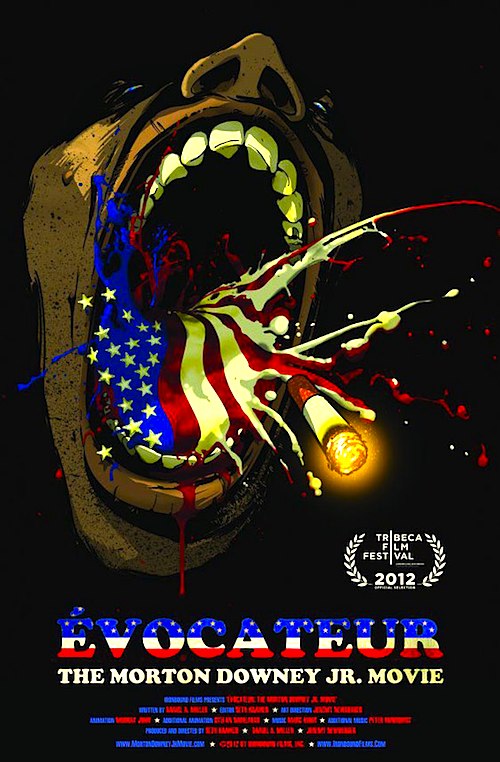 [Editor’s Note: the post below appears today at The Huffington Post and at AOL-Moviefone.]
[Editor’s Note: the post below appears today at The Huffington Post and at AOL-Moviefone.]
By Jason Apuzzo. Recently, while attending New York’s Tribeca Film Festival, I indulged in a guilty pleasure.
Wearing dark shades, and clutching my plastic media badge and a $7 bag of greasy popcorn, I stealthily ducked into a Chelsea multiplex to watch some of my youth flicker by across the big screen.
When I say ‘my’ youth, I’m also talking about the youth of millions of other guys who were teenagers during the late 1980s and tuned into politics. If you were around at that time, there’s probably one name you’ve never forgotten – no matter how hard you’ve tried: Morton Downey, Jr.
The movie I was watching was the probing and hilarious new documentary, Évocateur: The Morton Downey Jr. Movie. If you never had the chance to experience Downey in his prime, you really missed something. Downey was easily the most popular and controversial TV talk show host of his day – although that’s sort of like saying Genghis Khan was the most popular and controversial equestrian of his day. It doesn’t really capture the scale or the savagery of the phenomenon.
Downey was the id of the 1980s – a real-life Howard Beale, if you remember Paddy Chayefsky’s Network. Like some wild, genetic fusion of Howard Stern, Michael Savage and Howard Cosell, Downey invented the modern political talk show almost overnight during his colorful, meteoric career in the late 1980s – while becoming a tongue-in-cheek folk hero for political junkies like myself, especially (but not exclusively) for those of the teenage male persuasion.
Part rock star (he was a former singer, like his famous father), part populist firebrand, part stand-up comedian, Downey transformed political debate on TV from the staid, genteel disquisitions of David Brinkley’s “This Week” program into something closer to a Vegas floor show – or a night with the Rat Pack. Dangling his trademark cigarette, and wielding a cutting wit, Downey turned the political talk show into the kind of uninhibited, boozy, late-night pleasure it had never been before – and has never really been since.
Watching Downey do his routine all over again in Évocateur (more on the film below), several ideas came to mind about how to liven-up today’s creaky political talk shows:
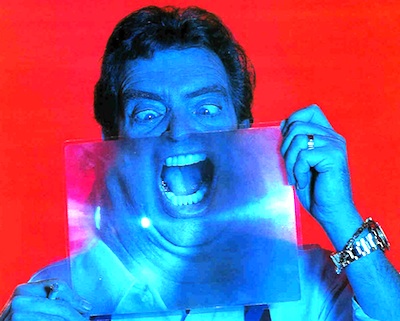
1. Encourage In-Studio Fistfights.
Let’s face it: most guests on today’s talk shows look like they’re just going through the motions – like they’re only concerned with their hair, and with being invited back. When was the last time someone upended a table, or stormed off a cable news show? It never happens anymore. Before Downey’s show, no one had ever seen political activists throw chairs at each other on national television, or watched ACLU lawyers battle screaming teenagers with mohawks, or watched Hollywood directors get dragged off stage – their legs flailing helplessly, as Downey’s working-class crowd hooted with joy. Downey’s guests were passionate, and always willing to put their bodies on the line when it counted (watch the legendary Al Sharpton-Roy Innis throwdown). There should be more fistfights, and table- and chair-throwing on political talk shows today – then maybe we’ll believe more of the nonsense these shows are spouting.
2. Bring Back Live Studio Audiences!
Why are today’s political talk show hosts so afraid of live studio audiences? Downey began his shows by high-fiving his crowd, even kissing the women in his studio audience. Downey’s hyped-up, seemingly inebriated audience (they often dressed in Halloween costumes) was encouraged to talk back to the show’s guests from a lectern known as ‘The Loudmouth.’ It was at ‘The Loudmouth’ that the audience lived out the primal fantasy of speaking truth to power – as teenagers, truck drivers, dental assistants and other regular folk got their chance to berate corrupt officials, phony celebrities, radical professors or gasbag political activists. It was this cathartic opportunity to abuse and humiliate the powerful that gave Downey’s show its special electricity. (“Step up to the Loudmouth” even became a catchphrase of the day.)
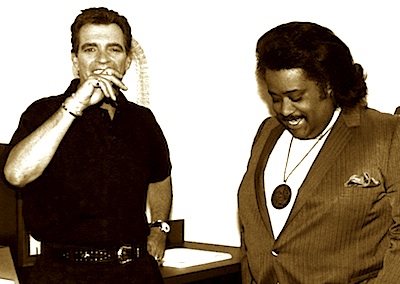
3. Invite Actual Human Beings on as Guests.
This is an important point: consultants, political strategists and journalists should be replaced by actual human beings on political talk shows. Although media figures of today like Al Sharpton, Gloria Allred and Alan Dershowitz got their first big breaks on Downey’s show (alongside even wilder guests like Joey Ramone of The Ramones, or Ace Frehley of Kiss), Downey rarely played it easy by inviting on the usual pundits – or even people conversant in the English language – to talk about issues. He instead found people who were colorful, off-beat, or in some way good foils for him and his hyper-charged studio audience. As a result, a lot of all-too-real people made their way onto his show: street hustlers, pro wrestlers, strippers, UFO conspiracy theorists, communists, small-time evangelists. Not even Fox News covers as much ground in this respect as Downey once did.
4. Boot Bad Guests Off the Show – Frequently.
This is the flipside of #3. Downey took great relish in booting dull or belligerent guests off his show – and this is really something today’s political shows should consider doing. Although Downey invited the most radical, combative and often freakish public figures of his day onto his show, sometimes their schtick didn’t work and the guest had to be cut loose – quickly. As an example from today, Fox News keeps bringing on some guy who’s listed as a ‘conservative comedian’ – but the guy’s never made me laugh once. He should be barked-at and ridiculed by Bill O’Reilly, then hauled off by security guards while a live studio audience throws wads of Kleenex at him. Then he might be fun to have around.
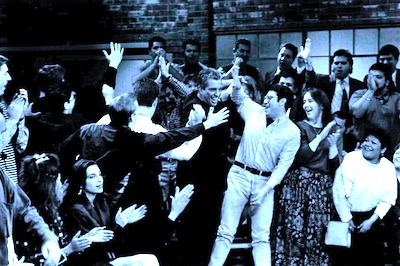
5. Get Up Off Your Behind!
Downey was rarely seated on his show; he prowled around the set for the full hour, gesticulating with a cigarette, pointing at the camera, hovering over his guests and bantering with the studio audience. It brought pizzazz and theatricality to the show. Plus, Downey understood that he was the real star of his show, which he why his guests as a rule stayed firmly planted in their seats – under threat of getting booted. Today’s hosts should get off their asses, get out from behind their desks, and start moving around more.
6. Drop the Dress Code.
Part of why people are so inhibited on today’s shows is that everybody dresses like they’re at a GE stock holders meeting. It’s boring. Downey frequently came onto his show in jeans, sans coat or tie. He also dressed up as Dracula once, and even wore war paint and army fatigues. Plus, his audience members sometimes dressed as gorillas, carnival clowns, or Cuban revolutionaries. It set the tone, and people loosened up.
7. Learn to Ignore the News Cycle.
This is a big one with me. The term ‘news cycle’ is really just another way to say: ‘whatever somebody else is talking about.’ It’s tedious to turn on the big cable news networks and see them covering identical subjects, day in and day out. Branch out! Be creative, the way Downey was (he once did a show on “Strippers for God”). Find news stories nobody else is covering, like: “Oil Drillers Who Dig with Their Teeth,” or “Green Technology You Can’t Afford.” It would liven things up.
8. When You Say Something Stupid, Apologize.
It’s inevitable that a host will say something stupid or otherwise regrettable over the course of doing a daily political TV show. Downey certainly did, and apologized when necessary. What’s annoying is when today’s hosts, in an effort to save their careers, double-down on stupid comments later – pretending that their inane remark (“Senator Smith’s wife has skin like a Maine lobster”) was actually a carefully considered policy statement (“Actually, my critics aren’t aware that before I was a TV talk show host, I worked at The American Crustacean Society. So I know what I’m talking about!”). It’s embarrassing. When you say something inappropriate, fess up, apologize and move on – in other words, be a human being.
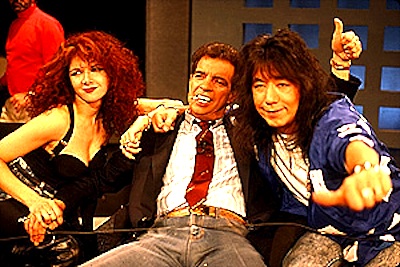
9. Feature Live Music.
A former singer himself, Downey occasionally brought live bands – mostly hard rock acts – onto his show to great effect. It gave the show a late-night, uninhibited vibe that today’s political shows desperately need. (Side note: in the absence of music, such primitive group behavior as chanting or catcalls should be encouraged from the studio audience.) Downey understood that the enemy of political talk shows is stuffiness – and nobody ever called his show stuffy.
10. Bring Cigarettes & Liquor Back to Late Night.
OK, admittedly this one is never going to happen – but it should.
Évocateur: The Morton Downey Jr. Movie
The suggestions above are just a few examples of what Morton Downey, Jr. would likely do to liven up political talk shows, were he around today. And who knows? Maybe somebody will actually take some of this advice and turn today’s dull, grimly earnest shows into the glorious, Rabelaisian carnivals of human excess that they could be.
In the meantime, thanks to Évocateur: The Morton Downey Jr. Movie, we can look back at how cathartic and liberating it once was to “step up to the Loudmouth.”
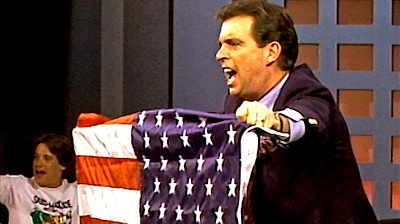
In Évocateur, filmmakers Seth Kramer, Daniel A. Miller, and Jeremy Newberger dig into Downey’s personal story, beginning with his privileged youth as the son of popular singer Morton Downey and actress Barbara Bennett (the sister of actresses Constance and Joan Bennett). We learn, in an incredible irony, that Downey was actually raised next door to the Kennedy compound at Hyannis Port – and was a lifelong friend of Ted Kennedy, with whom he clearly shared the same salty sense of humor.
Downey rambled through a series of careers as a singer and radio announcer until he finally hit his stride as a New Jersey TV host in the late ’80s, channeling mostly working class resentments against liberal cultural elites. (Sound familiar?) The moment his opera buffa-style talk show went national in 1988 it became an overnight hit – although it would last less than two years. After jumping the shark a few too many times – at one point even staging a fake assault on himself by neo-Nazis in an airport bathroom stall – his show petered out, his audience moving on to more sedate fare.
Évocateur does a fabulous job of bringing Downey’s cracked brilliance back to life with a slew of archival clips from his show, and interviews with former guests and co-workers. It’s clear that even liberals loved the guy – Gloria Allred and Alan Dershowitz have especially warm words for him, in particular.

After the Tribeca screening I asked Jeremy Newberger, one of the film’s directors, what made Downey different from today’s talk show hosts of either the conservative or liberal variety. “The [hosts] today … there’s more machinery in place to protect them,” Newberger said. “They have more infrastructure … a lot of these guys are in a vacuum, where no one gets to come across and have a different opinion without being edited out.”
“This guy [Downey] was tough, he was willing to speak his mind, and he had an interactive show – and he was pretty brave to do what he did.”
Newberger is right – Downey was brave. His show was a far cry from the stale, corporate programs of today that seem intent on insulating their high-priced hosts from criticism, awkward questions or interaction with regular citizens. Downey didn’t avoid such public exposure – he thrived on it.
Downey’s raucous show may not have been particularly noble or elevating – no doubt he turned political debate into something more vulgar and carnivalesque than it had ever been. But he also made political TV more earthy, entertaining and human – and nobody’s equaled him in that way since.
Posted on May 11th, 2012 at 2:09pm.
While I agree nearly completely with what they say, O’Reilly, Hannity, Boortz. I can listen to them today and then not again for another ten years they’re saying the same thing. I call it preaching to the choir.
Thanks for the reminiscences, Mr. Apuzzo.
The memory that stands out most in my mind regarding Morton Downey, Jr. was an appearance he made in the wrestling ring with “Rowdy” Roddy Piper in ‘Piper’s Pit,’ where he got a blast from a fire extinguisher to the face.